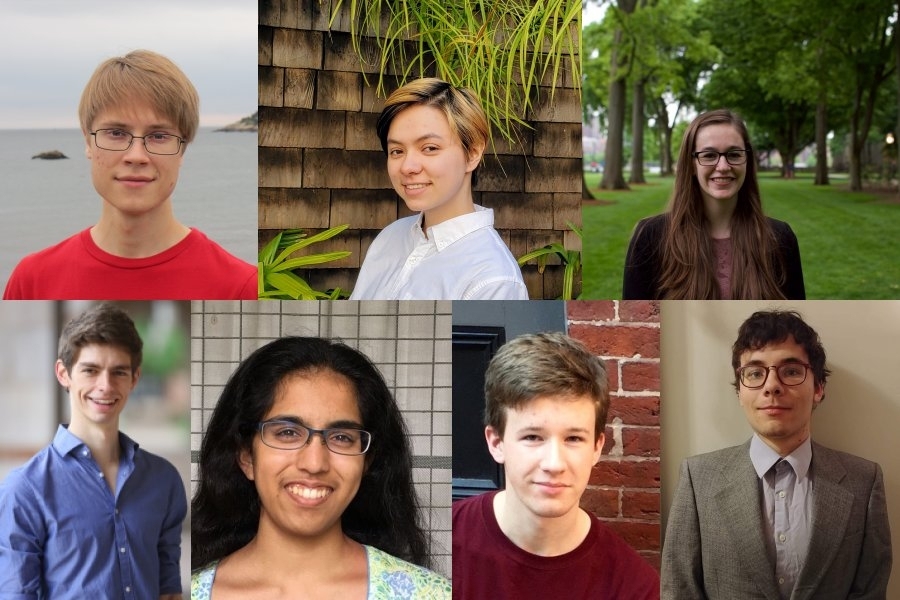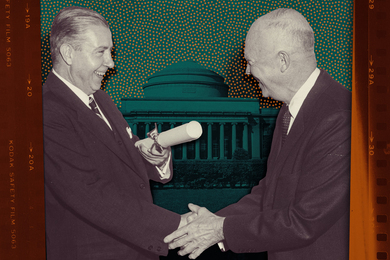The Fannie and John Hertz Foundation announced that it has awarded seven of its 16 graduate fellowships to MIT students this year — six recent graduates and one graduate student. These prestigious awards provide each student with five years of doctoral-level research funding with “the freedom to pursue innovative ideas, wherever they may lead,” as well as lifelong professional support from previous Hertz Fellows recipients.
This year’s winners are Alexander Alabugin '20, Alyssa Dayan '18, Marisa Gaetz '20, Isaac Metcalf '20, Nolan Peard '20, Maya Sankar '20, and Constantine Tzouanas.
The newly minted MIT Hertz Fellows were selected from a pool of over 800 students, representing 24 universities around the United States.
“The pursuits of our 2020 Hertz Fellows embody the type of bold, risk-taking research that the Hertz Foundation has supported for almost six decades,” says Robbee Baker Kosak, the Fannie and John Hertz Foundation president. “By funding innovative thinkers and connecting visionary researchers across generations, geography, and disciplines, we create the conditions for our fellows to have an exponential impact on the most pressing problems facing our nation and world.”
To date, there are 423 MIT alumni among the 1,200 Hertz Fellows named since the foundation’s inception in 1963, and 299 completed their doctorates at MIT. In fact, more Hertz Fellows have chosen to pursue their PhDs at MIT than any other university.
In addition to the seven fellows from MIT, three Hertz Fellows from other undergraduate institutions will soon join the MIT community as PhD students: Hannah Lawrence (computer science), Vikram Sundar (computational and systems biology), and Nico Valdes Meller (physics).
This year’s MIT recipients represent a broad spectrum of research interests and potential applications, from creating new materials to engineering biological systems.
Alexander Alabugin '20 plans to pursue chemistry further at the Caltech. Using a range of techniques such as electron resonance, Mössbauer spectroscopy, and X-ray absorption, he aims to better understand inorganic reaction mechanisms. Alabugin is also a fellow of the National Science Foundation.
Alyssa Dayan '18 completed her bachelor’s degree in mathematics and computer science. She is currently working on simulation and prediction for autonomous vehicles at Uber Advanced Technologies Group. Dayan will begin her PhD this fall at the University of California at Berkeley, focusing on machine learning and artificial intelligence.
Marisa Gaetz '20 graduated with a major in mathematics and a minor in philosophy. She has been deeply involved in MIT’s Prison Education Initiative and in efforts to improve diversity and inclusivity within the math community. She will remain at the Institute to begin her doctorate in mathematics, building on her work to date on the numerous connections between physics and representation theory.
Isaac Metcalf '20 graduated as a double major in materials science and physics. He plans to attend Rice University to pursue a PhD in materials science, focusing on increasing the efficiency and stability of two-dimensional perovskite photovoltaics. He’s the co-inventor of a patent-pending design of an electrochemical flow reactor for the carbon-neutral synthesis of calcium hydroxide.
Nolan Peard '20 completed dual degrees in physics and music in May and will begin his doctorate in applied physics at Stanford University this fall. He is especially interested exploring the use of optical techniques to control quantum states of molecules and their interactions, with the goal of creating materials and molecules with new capabilities.
Maya Sankar '20 graduated with bachelor’s degrees in mathematics and computer science, and a minor in music. Her passion for mathematics began at an early age, doing math problems with her dad, and she went on to participate in prestigious math competitions in high school. She will continue her studies at Stanford University, with a particular focus on combinatorics.
Constantine Tzouanas is currently a National Science Foundation Graduate Research Fellow in the Harvard-MIT Program in Health Sciences and Technology. He plans pursue a PhD in medical engineering and medical physics at MIT. Ultimately, he hopes to engineer biological systems with applications such as environmentally responsible chemical production and organ transplants.







